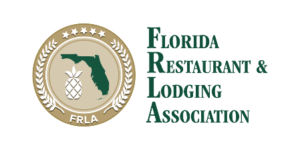
Revised 6/9/21
“Alcohol-To-Go is now signed into law – what does this mean for my business?”
SB 148 codifies and makes permanent the ability of SFS (aka SRX) licensees and quota licensees to sell alcoholic beverages for take-out and delivery when sold with food in the same order. This bill was signed into law May 13, 2021 and is effective July 1, 2021. This document explains requirements of the “Alcohol-To-Go” law for SFS and quota licensees. This is a general guidance document; FRLA is prohibited from providing situationally specific legal advice. Licensees needing information regarding how this new law may affect their specific business practices should seek advice from an attorney competent in beverage law.
For SFS Licensees
Two important things should be kept in mind:
- The SFS requirement that a minimum of 51% of sales be of food and non-alcoholic beverages still applies at all times. “Alcohol-To-Go” does not change this, and licensees will be held accountable for this requirement.
- SFS licensees are not permitted to engage in “package sales” and this new law does not change that. Sales of distilled spirits (aka liquor) in manufacturer-sealed containers/bottles are still prohibited. Sales of beer, wine, and mixed drinks are allowed under this law. At no time can SFS licensees operate as a “package store.”
“What alcohol can I sell “to go?”
You can sell wine and beer (including malt-based and wine-based cocktails), wine-based drinks prepared by the licensee, malt-based drinks prepared by the licensee, and liquor-based drinks prepared by the licensee. These items must be sold in sealed containers, along with food in the same order, for off-premises consumption.
“Does the law include packaging requirements?”
This answer has two steps.
First step – containing the beverage:
Beer and wine in manufacturer-sealed containers may be sold, as well as beer and wine in containers sealed by the licensee. Malt beverages must comply with the container size, labeling and filling requirements imposed by Chapter 563.06, Florida Statutes. Wine-based drinks, malt-based drinks and liquor-based drinks prepared by the vendor must be sold in a sealed container.
Second step – containing the container:
When the alcohol beverage is in a sealed container, that sealed container must be placed in another bag or container. The final, outer container must be taped, stapled, or otherwise securely closed in a tamper-evident manner, with a receipt for the sale attached to the outside of the outer bag or container. (For example: a paper bag stapled shut, with a receipt stapled to the bag.)
Every beverage sold for off-premises consumption must accompany an order for food. It must be packaged this way and leave the premises packaged this way.
For Quota Licensees
In addition to existing quota license privileges, quota licensees can now sell alcoholic beverages prepared by the licensee in a container sealed by the licensee for take-out or delivery when sold with food in the same order. A few caveats:
- The quota licensee must also be licensed as a public food service establishment under Chapter 509, Florida Statutes.
- Food and non-alcoholic beverages must comprise 40% of each sale, meaning only 60% of the total sale can be alcoholic beverages prepared and sealed by the licensee.
- Manufacturer-sealed beverages are not limited because quota licensees may already operate as package stores. Only alcoholic beverages prepared and sealed by the licensee count toward the 60% limitation.
- Sale and delivery of alcoholic beverages prepared and sealed by the licensee are prohibited after midnight or when the licensee stops food sales each day, whichever is earlier.
The packaging requirements for alcoholic beverages prepared and sealed by the licensee that apply to SFS licensees also apply to quota licensees.
For Both SFS and Quota Licensees
“What is a sealed container?”
A sealed container may come direct from a manufacturer, such as a bottle of wine or cans and bottles of beer. It can also be a container chosen, filled, and securely sealed by the licensee. There are many methods a licensee can use to satisfy this requirement when preparing its own beverages for takeout and delivery, but the licensee must use a container with an actual seal. Many suppliers carry products and supplies that can satisfy this requirement. Use a container with an actual seal that keeps the alcohol beverage contained during transport.
“What about delivery?”
Take-out or delivery orders of food that include alcoholic beverages must be delivered by an individual who is at least 21 years old, and only delivered into the possession of a person at least 21 years old. When transporting an alcoholic beverage for delivery that is not in a manufacturer-sealed container, the alcoholic beverage must be placed in a locked compartment, the trunk, or behind the last upright seat of a vehicle with no trunk. Delivery requirements of Chapter 561.57, Florida Statutes must be followed.
“What about open container laws?”
Alcoholic beverages that are properly sealed by the licensee and transported consistent with this new law do not violate open container laws. Transporting alcoholic beverages that are not properly sealed, or are unsealed and consumed, is a violation of open container laws.
